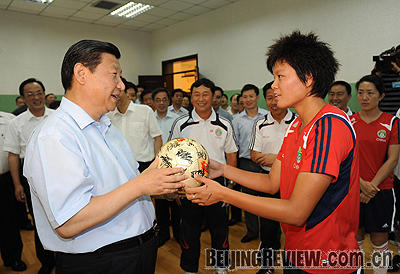|

FOOTBALL TOUR: Chinese Vice President Xi Jinping (front left), receives a signed football from a member of China’s women football team during his inspection tour of Olympic preparations in Qinhuangdao, a co-host city 280 km away from Beijing
Olympic Working Hours
The Beijing Municipal Government announced that the city's state-owned enterprises (SOEs), institutions and social groups should adjust their working hours from July 20 to September 20 to avoid traffic jams.
The Olympic Games will last from August 8 to 24, and the Paralympics from September 6 to 17.
A notice issued by the municipal government said that, except for schools and institutions that provide essential services, SOEs should operate from 9 a.m. to 5 p.m.
Large shopping centers should open at 10 a.m. and stay open later in the evening. Other institutions should operate from 9:30 a.m. to 5:30 p.m.
Government departments will not alter their hours, the notice said.
The notice also encouraged institutions to handle business online if possible and make flexitime arrangements where feasible.
New Earthquake Subsidy
The Chinese Government has come up with a new subsidy plan for quake survivors starting in September that will give each survivor experiencing financial hardship 200 yuan ($29) per month, a State Council statement said.
The quake, on May 12, left millions of people homeless and destitute. The policy will cover orphans, the elderly and the disabled without family support, those whose relatives were killed or severely injured, people who were displaced and people whose homes were destroyed, it said. Elderly and disabled people without family support will receive more than 200 yuan ($29), the statement said, without elaborating.
Since the disaster, every needy survivor has been eligible to receive 10 yuan ($1.4) and 500 grams of food a day. The policy has covered about 8.82 million people but will end in August. The new system will not include any food allotment and will expire in November, the statement said.
Media Freedom Stressed
Foreign journalists should complain formally if they have any problems in doing their jobs during the Beijing Olympic Games, senior Chinese leader Li Changchun said during his recent visit to the Beijing International Media Center (BIMC). The center was opened on July 15 to serve more than 5,000 non-accredited reporters during the Games. Li, a member of the Standing Committee of the Political Bureau of the Communist Party of China Central Committee, said officials would effectively implement regulations that ensured foreign journalists would be allowed the freedom to report.
"If you are dissatisfied, you can file your complaint directly to Liu Qi, President of the Beijing Organizing Committee for the Games of the XXIX Olympiad," he told reporters.
Li said the center could provide broadcast transmissions around-the-clock. He promised to ensure the security of transmissions, a major concern of overseas journalists, and asked the staff to strengthen security measures.
Regulated Hearings
China's top economic planner has begun soliciting public opinion on a revised draft regulation aimed at improving the transparency of public hearings on price setting.
The number of consumers in a public hearing on price setting should be no less than one third of the total attendance, according to the revised version, released on the website of the National Development and Reform Commission, on July 14.
The current regulation has no lower limit on the share of consumers in a public hearing on prices.
In addition to a price-setting plan, the regulation adds that a report on the cost of prices is demanded from the price fixer.
The draft regulation also states for the first time that public hearings must allow media coverage and the presence of observers.
Government staff who neglect their duty, abuse power or cheat in the organization or proceeding of hearings will be punished, with criminal penalties for serious cases, said the draft. | 